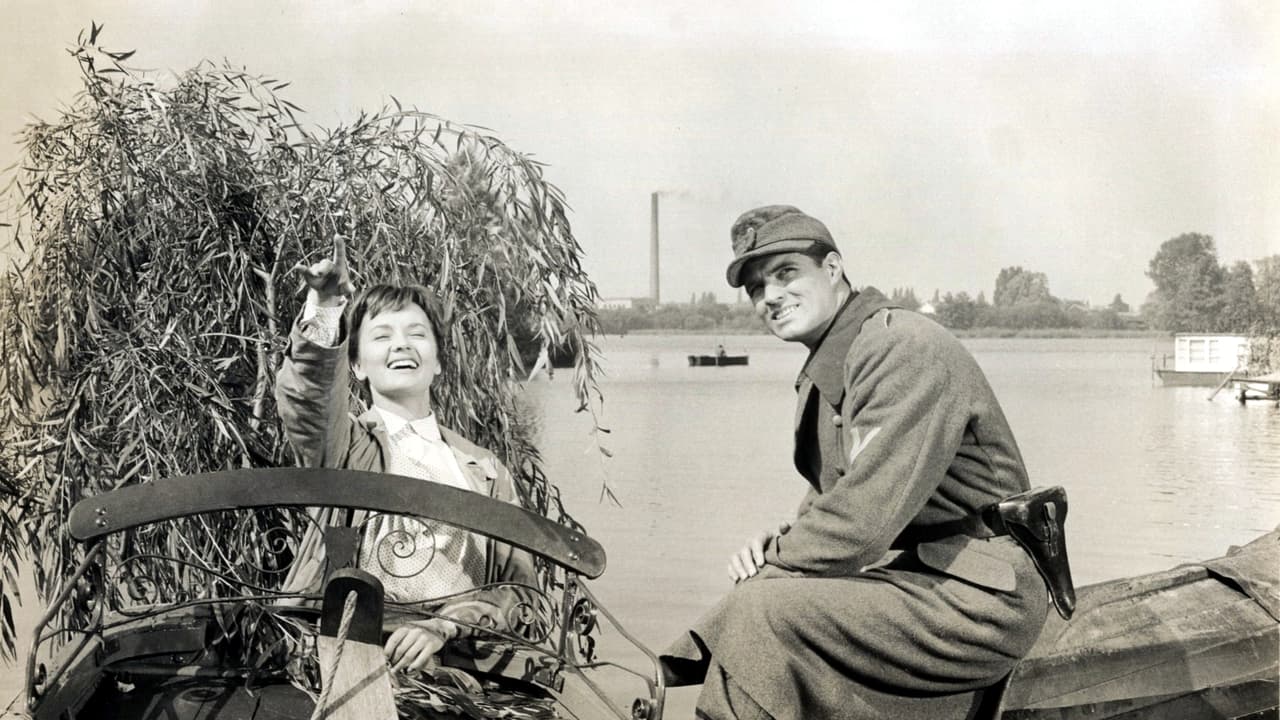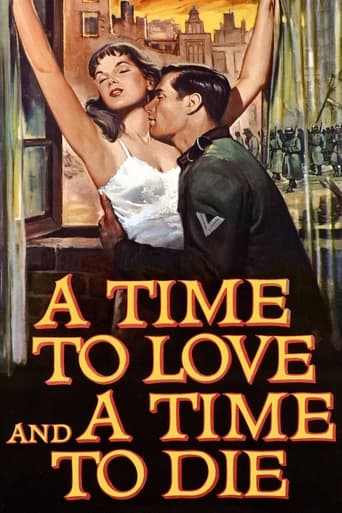



It is a performances centric movie
This is a small, humorous movie in some ways, but it has a huge heart. What a nice experience.
View MoreThe plot isn't so bad, but the pace of storytelling is too slow which makes people bored. Certain moments are so obvious and unnecessary for the main plot. I would've fast-forwarded those moments if it was an online streaming. The ending looks like implying a sequel, not sure if this movie will get one
View MoreThis is a small, humorous movie in some ways, but it has a huge heart. What a nice experience.
View MoreWhilst having read high praise of his creations for years,I somehow have never got round to seeing a title by auteur director Douglas Sirk. Checking with my dad about what he has recently sold on eBay,he mentioned a Sirk DVD that was about to be sent,and asked me if I would like to watch it before it goes,which led to me putting some time aside for A Time to Love and a Time to Die.View on the film:Filming in Germany for the first time since fleeing from the Nazis,auteur director Douglas Sirk & cinematographer Russell Metty superbly use the lush beauty of Sirk's Technicolor stylisation to starkly show the devastation of war. Unable to work in the Soviet-controlled part of the country, Sirk and the crew reinforce bombed out buildings and build entrances,exits and stairways within them, giving the scenes of Graeber and other soldiers lifting bricks to find survivors of the latest air raid bombing an earthy atmosphere. Ending on a haunting image possibly referencing the death of his son Klaus Detlef Sierck, (Sirk's ex-wife Lydia Brincken Joined the Nazis and got Klaus to become a child star in Nazi propaganda films,along with barring Sirk from seeing Klaus after Sirk married Jewish actress Hilde Jary. Klaus died as a solider on the then-USSR Ukrainian boarder on 22 May 1944) Sirk and Metty contrast the autumn colours of Ernst Graeber and Elizabeth's romance with an uncomfortable, threatening mood,lit in the casual manner the Nazis sit back and tell Ernst of the latest people they have sent to the concentration camps,brilliantly underlined by a shimmering score from Miklós Rózsa.Giving his own seal of approval by co-staring in the adaptation of his own book,Orin Jannings take on Erich Maria Remarque's novel takes an intelligent, novel-like approach to Elizabeth and Ernst's romance, starting from a collage of them piecing each others common interests with flirting and tempting asides, to a blossoming romance held by them each willing to risk their lives for the others safety. Hardly featuring any signs of the Allies, Jannings goes behind enemy lines and follows those trapped inside Nazi Germany, where Ernst's time on the battleground has made him well aware of the threat loyal Nazi solders and informants hold towards murdering the Jewish Elizabeth and him.Appearing in the first of two films for Sirk,John Gavin gives an incredible performance as Ernst,whose romantic side is pinned by Gavin with a quick-witted edge to search for his parents out of sight, and to keep Elizabeth out of the Nazis grip. Looking absolutely beautiful from her first appearance, Liselotte Pulver gives a magnificent performance as Elizabeth,via bringing a real delicate touch to the early stages of the romance,that transforms into a burning passion for Ernst and Elizabeth's desire to fight to make this a time to love.
View MoreI can recommend this war film. Despite distracting weaknesses in production quality, the power of the material carries the viewer along very effectively. The scenario is the dying days of World War II from the perspective of a German soldier. This represents unusual material for Hollywood, and romantic leading man John Gavin is odd casting as the hero. Although his flashes of American pearly whites are incongruous, he and indeed all the actors do quite well in their parts although hampered by the forced pace of the direction and the artificial quality of the sound recording. Clearly overdubbed, the dialogue has the quality of a read- through in an indoor studio, despite most of the action being out-of-doors. The cinematography is quite good and the sets impressive as the soldier Ernst moves from the horrors of the Russian front to the heavily-bombed hometown where he returns on leave. Trying to find what has become of his parents, he receives little sympathy from his countrymen and women, who are deadened (or maddened) by the bombardment from the skies they are experiencing. Officialdom is represented by a range of repulsive types, underlining the moral ambiguity the hero is struggling with after his experiences on the front. Where in all this horror is anything worth living for? The answer comes in his developing relationship with the winsome Elizabeth, portrayed by a delightful actress whose name is not familiar to me. What hopes of happiness in the maelstrom of the times? A poignant moment comes when the couple fantasize where they would like to go for a honeymoon, only to reflect that as Germans they would be hated just about everywhere. I found this a memorable film.
View MoreThe films of Douglas Sirk have been variously described as "masterpieces" and "tosh". I think the answer lies somewhere in between. Certainly the series he made at the peak of his career for Universal International in the 'fifties are romantic melodramas of a superior kind. Although photographed in gaudy chocolate-box colours with soundtracks overladen with scores drenched in aural syrup and with sometimes the most outlandish of plots - "Magnificant Obsession" for instance - they have, beneath their surface glitter, a hard edged observation of an affluent American society struggling to come to grips with moral values - "All that Heaven Allows" and "Imitation of Life" are particularly good examples. But, interesting as these film are, it is the odd man out, a film set not in America at all but in Germany and the eastern front in the closing stages of the Second World War, "A Time to Love and a Time to Die", that, in spite of its not inconsiderable unevenness, could well be his most lasting legacy. Its most striking feature is that, notwithstanding its vastly different territory, it remains a Sirk film stylistically. The director almost seems to be signing his signature with the shot of pink blossom against the opening and closing credits. Although the outer sections of a German unit under shellfire on the eastern front are the very stuff of warscape recreation at their near best, it is the long central passage where the young German soldier - surprisingly well played by John Gavin - returns on leave to his heavily bombed town, that is the most Sirkian. Here, between devastating airaids, the hero forms an idyllic romantic attachment to a vaguely remembered friend from childhood followed by a whirlwind courtship. Amazingly for the last night of his leave the couple find, amidst all the devastation, an untouched house for the consumation of their marriage, where they are tended by a kindly frau who brings them a bottle of wine from the cellar. At this point the airaid is only glimpsed through the window. At an earlier point in the leave the couple dine in an unbelievably stylish restaurant, although here at least Sirk has the honesty to interrupt the proceedings with a pretty devastating direct hit which leaves one diner running is a sea of flames. If I have reservations about some of the romantic trappings of the scenes in Germany, I have none about the intense realism of the scenes on the eastern front. Would that the film was all on this level.
View MoreYes a time to praise Douglas Sirk,this magnificent director,too often forgotten!This movie is arguably his masterpiece.He used to work in Germany before making a career in the USA,and this war that tore apart his adoptive homeland would necessarily urge him to express his pacifism.So,he adapted Erich Maria Remarque ,whose books were burned by the Nazis and who plays a part in the movie. Some people said the title was melodramatic and dumb.On the contrary,it indicates that Ernst's and Elisabeth's happiness will be short-lived,so every moment is to be treasured,and we know their love will never know a humdrum mediocrity. Sirk's camera circles round calcined beams,ruined houses,nightmare landscapes.A sublime shot shows a hearse that stands still in a desert street ,while inhabitants take refuge in the shelters. A subplot is downright fascinating;Ernst meets up with an old friend again:this friend is rather dumb ,good to nothing,but he lives in a luxury flat,having taken advantage of the nazi rising.Later,Louis Malle will focus his whole film on such a character in "Lacombe Lucien". Compare the buddy's attitude with that of Elisabeth when Ernst wants to give her some food.She refuses so proudly he's forced to give it to a whore. Back to the front,Ernst will meet death in a very absurd way:understanding -like Elisabeth before him- the atrocity and the stupidity of the war he's waging,he tries to help Russian partisans and his fate is sealed.He tries ,in a last gesture ,to catch his wife's letter that the current sweeps along.Superb.(compare with the ending of Remarque's "all quiet on the western front" made by Lewis Milestone)NB.Sirk's son was probably killed in Russia and the final scenes might tell what had happened to him;Sirk's first wife forced his boy to join the Nazi,partly out of revenge cause Detlef Sierck 's second wife was a Jew.
View More